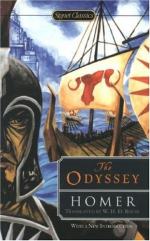At Erythrae, Homer fortunately met with a person who had known him in Phocaea, by whose assistance he at length, after some difficulty, reached the little hamlet of Pithys. Here he met with an adventure, which we will continue in the words of our author. “Having set out from Pithys, Homer went on, attracted by the cries of some goats that were pasturing. The dogs barked on his approach, and he cried out. Glaucus (for that was the name of the goat-herd) heard his voice, ran up quickly, called off his dogs, and drove them away from Homer. For some time he stood wondering how a blind man should have reached such a place alone, and what could be his design in coming. He then went up to him and inquired who he was, and how he had come to desolate places and untrodden spots, and of what he stood in need. Homer, by recounting to him the whole history of his misfortunes, moved him with compassion; and he took him and led him to his cot, and, having lit a fire, bade him sup.
“The dogs, instead of eating, kept barking at the stranger, according to their usual habit. Whereupon Homer addressed Glaucus thus: O Glaucus, my friend, prythee attend to my behest. First give the dogs their supper at the doors of the hut: for so it is better, since, whilst they watch, nor thief nor wild beast will approach the fold.
“Glaucus was pleased with the advice and marvelled at its author. Having finished supper, they banqueted afresh on conversation, Homer narrating his wanderings, and telling of the cities he had visited.
“At length they retired to rest; but on the following morning, Glaucus resolved to go to his master, and acquaint him with his meeting with Homer. Having left the goats in charge of a fellow-servant, he left Homer at home, promising to return quickly. Having arrived at Bolissus, a place near the farm, and finding his mate, he told him the whole story respecting Homer and his journey. He paid little attention to what he said, and blamed Glaucus for his stupidity in taking in and feeding maimed and enfeebled persons. However, he bade him bring the stranger to him.
“Glaucus told Homer what had taken place, and bade him follow him, assuring him that good fortune would be the result. Conversation soon showed that the stranger was a man of much cleverness and general knowledge, and the Chian persuaded him to remain, and to undertake the charge of his children.”
Besides the satisfaction of driving the impostor Thestorides from the island, Homer enjoyed considerable success as a teacher. In the town of Chios he established a school, where he taught the precepts of poetry. “To this day,” says Chandler, “the most curious remain is that which has been named, without reason, the School of Homer. It is on the coast, at some distance from the city, northward, and appears to have been an open temple of Cybele, formed on the top of a rock. The shape is oval, and in the centre is the image of the goddess, the head and an arm wanting. She is represented, as usual, sitting. The chair has a lion carved on each side, and on the back. The area is bounded by a low rim, or seat, and about five yards over. The whole is hewn out of the mountain, is rude, indistinct, and probably of the most remote antiquity.”




